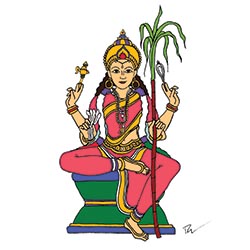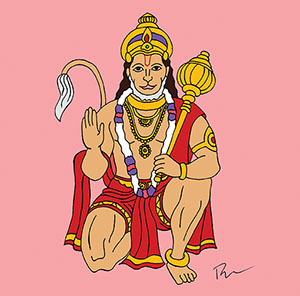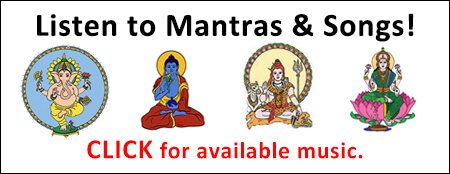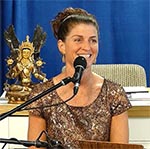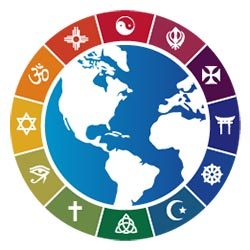
Deity Meaning Comprehensive Guide
The Supreme Being in Eastern & Western Traditions
Deity meaning covers many aspects of religious experience. This article includes a definition of deity meaning in world religions, characteristics of God, benefits of prayer, Catholic saints, Eastern religions, mythology, and spirituality. The role of psychology in personal religious beliefs and deities around the world are also included.
Share this page with a friend!
Meaning of the Word “Deity”
The word “deity” is thought to have been coined by Saint Augustine in the 14th century. However, the roots for the word “deity” go further back in many languages. Nearly every language has a word that can be translated as God. The following are some of the relatively modern origins and brief definitions of the word “deity.”
Deitee–Middle English-divinity, God
Deite´–Anglo-French-God
Deitas–Late Latin-vocative singular-God
Dios–Greek, Spanish-Godhead
Deva–Sanskrit-to gleam or shine, heavenly, God
In many traditions, broadly classified as Western religions, the deity is viewed as a supreme or supernatural being controlling some or all aspects of the world. In other traditions, often Eastern in origin, the deity refers to any being who has attained the estate or rank of a god. In the latter case, a deity may rise or fall from grace rather than existing in an eternal state or form.

Deity Meaning in World Religions
In monotheism, the deity is a singular force. This presence is a type of immortal goodness, often masculine. A monotheistic deity is omniscient (all-seeing) and omnipotent (all-powerful). In contrast with this, many ancient cultures deify nature and the forces of nature to create a pantheon of gods and goddesses. This includes the Mesopotamians, Egyptians, Greeks, Romans, and Germanic peoples. In some forms of polytheism, ancestors or ancestral forces also take on deity meaning.
Eastern Deities
In Eastern religions, deities are a broad category that may include ethical concepts such as the personifications of ideas and knowledge. Vedic deities may also be humans who gained merit and achieved the status of a deity through their effort and spiritual disciplines.
View of the Deity in Hinduism
In Hinduism, the Upanishads view the atman (soul, self) as synonymous with “deva” or the deity. The atman is an eternal or supreme god that is part of every individual. The spiritual path is to connect with this innermost being, thus gaining self-knowledge of the deity.
Demons Versus the Deity
Occasionally the concept of a deity can include an “evil god” or demon. In Old Persian, the word “daiva” means a harmful god. In pantheism, the universe itself is viewed as God. From this viewpoint, everything that exists and God are equivalent.
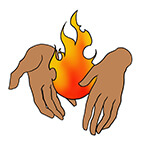
Characteristics of God
Deity meaning around the world is a vast topic! Ancient and modern forms of the deity are so varied as to be nearly overwhelming. In addition, our interpretations of God are often contradictory. Is God male or female? Peaceful or warlike? Loving or judgmental? Personal or ineffable? Is God a definable being or simply a type of transformative energy?
Human Psychology and the Deity
Our answers to the question of deity meaning may tell us more about ourselves than about God. Creation stories exist in nearly every tradition. Some anthropologists suggest that we create God in our own image rather than the other way around. Indeed, many of the beings that are purported to inhabit other dimensions have very human-like characteristics.
Deity Evolution and Historical Figures
Others believe that many deities are based on historic figures. For example, some ancient historians have traced Norse Gods to kings and rulers in the far distant past. This may be true in other cultures as well. This doesn’t necessarily denigrate their status. In fact, this may make forms of the deity more relatable and easier to emulate.
Ancient Deity Meaning
Many ancient deities are based on the patterns and power of nature: spring, solstice, harvest, the sun, the moon, storms, fire and so forth. Some still form the fabric of modern life in ways that we usually don’t consider. For example, the months or the year and days of the week are almost exclusively names after ancient gods and goddesses.
Deity Meaning and the Natural World
Expressions of gratitude for the abundance all around us and the blessings of the natural world are present in every spiritual tradition. Many of our holidays including Christmas and Easter are based on ancient pagan celebrations. The selections below include information, mantras and songs in honor of these aspects of our lives.
Ancient Deities and New Religions
Some ancient deities have morphed over time or been absorbed or adopted into new religions. For example, some experts believe that the sun god played a large role in early Christianity. In the iconography of Jesus, He is often depicted with a sun around his head.
Greek and Roman Deities
Perhaps this is even closer to classical mythology and the heroes and heroines of the Greeks and Romans rather than Catholic saints. The gods of the Greeks and Romans seemed quite human in their jealousies, passionate emotions, and relationship challenges. However, I don’t mind that the gods and goddesses sometimes seem less than holy. Sometimes imperfection is the price of being are passionately alive. Perhaps they are sometimes mistaken but they are never lukewarm. I appreciate that. Living with confidence and fearlessness is worth a misstep now and then.
Deity Meaning in Hinduism
The Hindu gods and goddesses represent aspects of consciousness. Ultimately it seems that we will reach a state where we experience ourselves as part of everything that is in existence and part of every possible mental, emotional and psychological state. For this reason, my personal view is that the multiplicity of deities in Hinduism is not in conflict with monotheism. In fact, the pantheon of Hindu gods is reminiscent of the many Catholic saints of my childhood.
Forms of the Goddess in Hinduism
A significant characteristic of Hinduism is the emphasis on the personification of god in both masculine and feminine form. This polarity carries through every form of the deity. Every god has a consort, sometimes many. The ideal of devoted lovers is exemplified by many pairs of divine partners in the pantheon. One of these pairs is Sita and Ram, heroine and hero of the epic scripture known as the Ramayana.
Divine Mother and Feminine Deities
There are thousands of forms of the Divine Mother, Goddess or Divine Feminine in Hinduism. In fact, each individual goddess may have a thousand forms and names. The goddesses are celebrated in a way that is not present in the religious and spiritual traditions in the Western world. Devotion to a particular deity may be an individual choice or may be connected to local or regional areas. The following goddesses are included below: Devaki, Durga, Jagadambe Ma, Kali, Lakshmi, Lalita, Mataji, Parvati, Radha, and Saraswati.
Watch nearly 400 videos on the Vocal Medicine Channel!
Origin of the Hindu Deities
For thousands of years the rishis of India (Hindu sages) experimented with the effects of mantras. The names of Hindu deities appear to be consciously created formulas for freedom on the physical, mental and spiritual levels. Mantras focused on the names of the gods and goddesses in the Hindu pantheon are coded compilations of sound designed to produce elevated states and to stimulate health and longevity.
Hindu Deities and the Natural World
In addition, many of the Hindu gods and goddesses are associated with forces in nature, also a common theme among ancient deities in other traditions. These gods and goddesses are created or inspired by fire, wind, mountains, rivers and so forth. The fundamental forces of nature shape our lives. Stories and mantras dedicated to them celebrate their blessings, attempt to harness their power, or seek to mitigate their impact on human lives.
Superheroes of the East
Many of the Hindu deities have superpowers similar to the superheroes of the West such as Spiderman, Batman and Catwoman. The Eastern superheroes are featured in Hindu mythology as examples of strength, loyalty, devotion and other desirables qualities. Stories of their lives may be historical in some cases or serve to teach moral or ethical values. These deities include Ganesha, Govinda, Hanuman, Krishna, Nataraja, Rama and Shiva.
The Evolution of Goddesses in the West
The goddesses are protectors of mantra, sexuality, and self-realization. Some goddesses are gentle and loving. Others are wrathful demon-slayers. Most Indian yogis teaching in the West did not originally introduced the concept of Hindu gods and goddesses, but preferred to have their students practice yoga within the context of their own faiths.
The Great Mother as the Original Deity
However, from Neolithic times until about 1500 years ago, the Great Mother was honored virtually everywhere on earth. During the past 15 centuries, most cultures gradually lost their traditions and the deity meaning of the Divine Mother. Only in India (and scattered indigenous cultures) has the wisdom of the Great Goddess been preserved intact on a massive scale. In the last decade in the West, there has ben an explosion of interest in goddess sprituality.
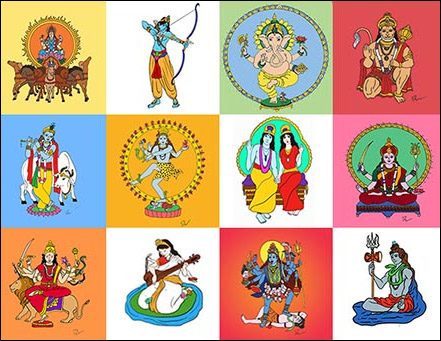
Deity Meaning from Around the World
The pantheon of deities and their associated symbolism are endlessly colorful, fascinating and inspiring. God may be the ultimate mystery. The symbolism that illuminates deity meaning is absolutely essential. The list of deities below is just a small sample of the extensive pantheon of deities inhabiting this extraordinary universe.
Qualities of Worldwide Deities
The list of gods and goddesses below includes brief stories and descriptions of the qualities and benefits that may be derived from devotion to the principles and ideals that they personify. There are many thousands of forms of the deity worldwide.
A Selected List of Deities
This is a selected list of my favorites and some of the more well-known deities. Links to mantras associated with these deities are also provided. Mantras are keys to connecting with and embodying the aspects of God’s consciousness exemplified by a particular deity.
Alphabetical List and Related Links
Follow the links below to find music, information and illustrations for a selected number of forms of the deity in various world traditions. Some of these forms of God are personified and some are principles or concepts.
Aditi: Hindu Sky Goddess
Aditi is the Hindu sky goddess, mother of the gods and the twelve astrological spirits from whom the heavenly bodies were born. She may be seen as a feminine Brahma associated with prime cause or substance. Aditi is mentioned about 80 times in the Rigveda and also in the Puranas.
She is the consort of Kashyap and mother of thirty-three sons known as the Adityas. The Aditayas include Surya, Indra and Vamana. Aditi is regarded as both the sky goddess and the earth goddess, a rare combination. The sky is usually a realm reserved for masculine personages. Her characteristics are motherhood, creativity, freedom and might.
Watch nearly 400 videos on the Vocal Medicine Channel!
Agni Deva: Deity Meaning Fire
Symbolic and physical fire have been associated with religious traditions around the world for ages. Agni Deva is the masculine deity meaning holy fire or spiritual fire in the Hindu tradition. Fire is the perfect metaphor for release and the transformation of unwanted patterns, situations, and personal characteristics.
Fire is an expression of both light and heat—two fundamentals for the sustenance of life. “Agni” is the Sanskrit word for “fire.” Fire can take many forms in the universe including lightning, the rays of the sun, physical fire and divine radiation. Listen to the Agni Deva Mantra and read more at Agni Deva: Lord of the Fire Element.
Astara or Ostara: Deity Meaning Spring
Astara or Ostara is the Germanic goddess of spring. She is a deity meaning hope and return to life. Her name (also spelled Eostre) is the root of the spring celebration now known as Easter. She is associated with many Easter customs including Easter eggs and rabbits. Astara’s name means “star” or “to shine.” She is also sometimes referenced as a goddess of the dawn, a bringer of light after the dark night. Astara may be synonymous with Freya, the Norse goddess and consort of the the Nordic god of music.
Feast were held in honor of Astara and the renewing of life after the winter. This celebration became the Christian celebration of the resurrection of Jesus. Astara was revered by the Babylonians, the Sumerians, and the Persians as the goddess of spring and fertility. Read full article about Astara/Ostara.
Bhudhaya: Deity of Mercury
Bhudhaya is the Hindu god ruling the planet Mercury. In Vedic astrology, the planet Mercury is associated with intelligence, logic, speech and friendship. Mercury also governs memory and transportation. Mercury is a messenger, delivering thoughts from one person to another or back and forth between celestial beings.
The Greek god Hermes is the same as the Roman god Mercury, known as the most clever of the gods and the winged messenger ruling over wealth, good fortune and commerce. Listen to a mantra to Bhudhaya and read about Astrology Mantras.
Brihaspati: Deity of Jupiter
In Vedic astrology, Jupiter is known as Guru (spiritual teacher), Devaguru (teacher of the gods) and Brihaspati (Lord of Light). Jupiter is a planet of work, development, education and higher spiritual insight. Some astrologists view Jupiter as the planet of optimism, success and generosity. Jupiter is immense, mature and benevolent. Read full article about Astrology Mantras.
Chandra: Deity of the Moon
Chandra, the ancient deity of the moon in the Hindu tradition, is also associated with the night, vegetation and plants. Chandra is sometimes called Soma, a name that refers to the sap or juice that is the lifeblood of plants.
In the Greek and Roman religions, the moon was personified as the goddess Selene. In the Hindu tradition, the name Chandra means “bright and shining.” The moon in Vedic astrology represents the mind, including thoughts, feelings, and psychology. Read full article about Astrology Mantras.
Devaki: Mother of Krishna
Devaki is the Hindu goddess of childbirth. She is also the mother of Krishna. Devaki and her husband Vasudeva were imprisoned by Kamsa, an evil king who feared a prediction that their eight child would overthrow him.
Kamsa kills each of their male children after birth. The eighth (Krishna) is smuggled out to live in the country with surrogate parents. This is the origin of Krishna’s childhood names: Gopala and Govinda mean “the one who protects the cows.” Hear a mantra to Devakinanda and learn more about Krishna and Devaki.
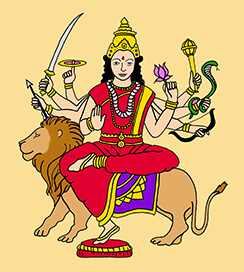
Durga the Warrior Goddess
Durga is a goddess of protection, a demon-slayer. She is a Hindu goddess known by many names including Bhagini (sister), Devi, Shakti and more. Durga is an embodiment of the Divine Mother, an expression of the Divine Feminine. Durga is a warrior goddess. She overthrows the forces that threaten peace, prosperity and all that is good. The name Durga means a fort or a place that is difficult to overrun. She is also known as the Mother of the Universe.
Durga is a goddess who saves her devotees from difficulties whenever possible. She personifies the vibration of the fierce mother, only moving into battle to protect her own and never for the sake of violence. Durga leads a divine army and rides a lion. Her pose exemplifies courage and freedom from fear. Read full article about Durga the Warrior Goddess and listen to Durga Mantras.
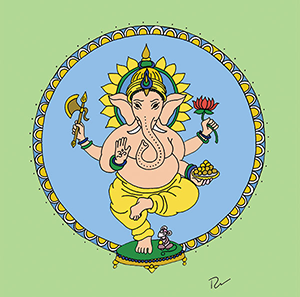
Ganesha the Elephant-Headed Deity
Ganesha, also known as Ganapati or Lord Ganesh, is the elephant-headed son of Shiva and Parvati in the Hindu tradition. He is a deity known for assisting devotees in the overcoming of obstacles. Therefore, Ganesha is often invoked at the beginning of an activity, journey or other undertaking.
Ganesha is one of the most well-known and popular deities in the Hindu pantheon. Ganesha is a joyful being associated with extensive symbolism. He is the foremost deity associated with the root chakra. The sheer weight of an elephant makes Ganesha a natural choice for the chakra that connects us to the earth and the earth element. Hear a Ganesha mantra and read a full article about the origin of Ganesha.
Ganga Mata: Deity Meaning Water and Purity
Gange Mata is a Hindu goddess personifying the Ganges River. She is a deity associated with forgiveness and purification. Water is a symbol of purity in many spiritual traditions, used for cleansing and baptism. Ganga is often depicted riding on a Makara, an animal with the head of a crocodile and the tail of a dolphin. The crocodile represents the lower self or the reptilian mind over which Ganga has gained mastery. The Vedas and Puranas, Hindu scriptures, view the Ganges as the most sacred river on earth. The Ganges river is viewed as a gateway to heaven. Read more and hear a mantra to Ganga Mata.
Govinda: Childhood Form of Krishna
Govinda and Gopala are both childhood names of Krishna. Some scholars say that “go” means both “cow” and “light.” These names literally mean the protector of the cows. Symbolically, they mean the protector of the sacred truth.
Shortly after Krishna was born, he was sent to live in the country to protect him from the evil king Kamsa. Kamsa believed that Krishna would overthrow him and intended to kill him. For this reason, Krishna (Govinda, Gopala) grew up living an idyllic rural life as a cow herder. Hear Krishna mantras and learn more about Krishna.
Hanuman: Eastern Superhero
Hanuman is the monkey-god, hero of epics and stories in Hinduism, Jainism and Buddhism. In Hinduism, Hanuman is the ardent devotee of Lord Rama, and central to the epic poem Ramayana. Hanuman is sometimes depicted as the patron of martial arts, wrestling, and acrobatics. He is also the patron of meditation and scholarship.
Hanuman possesses many superhuman powers. For example, he cannot be killed with lightning or drowned or harmed by fire. The name “Hanuman” combines the Sanskrit words “han” meaning killed or destroyed and “maana” meaning pride. According to this interpretation, Hanuman’s name means “one whose pride was destroyed.” Hear a Hanuman mantra or learn about the symbolism of the Hanuman Yantra.
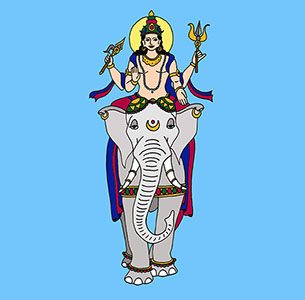
Indra: Deity Meaning Heaven, Sky & Thunder
Indra is an ancient Vedic or Hindu deity associated with the sky, lightning, storms, rain and war. Indra holds a thunderbolt as his primary weapon. He also holds a trident representing his mastery over the three primary forces (creation, preservation and destruction) and raises a hand in blessing. Indra rides a white elephant named Airavata. Sometimes Airavata has five to seven trunks and four to ten trunks.
The elephant symbolism the earthly nature or the earth itself. Indra has mastered all that is related to earthly existence. Indra is also depicted holding a goad in his right hand. The goad is used to drive away ignorance, laziness and sluggishness.
Jagadambe Ma: Mother of the Universe
Jagadambe Ma means “mother of the world” or “mother of the universe.” The term is used for many goddesses including Adi Shakti, Parvati, Saraswati, Lakshmi, Sita and Radha. There are temples in India dedicated specifically to Jagadambe including the Devi Jagadambe Temple in Madhya Pradesh and the Shree Jagadamba Devi Temple in Kerala.
The Divine Mother plays a huge role in Hinduism, sometimes receiving even more attention and devotion than God in masculine form. Each goddess has multiple attributes. Goddesses are often known by dozens, hundreds or even thousands of names. Each name emphasize a particular quality of the goddess. “Shakti” is a general term for the energy that pervades the universe and gives rise to all form and action. Read full article and listen to a mantra to Jagadamba, the Mother of the Universe.
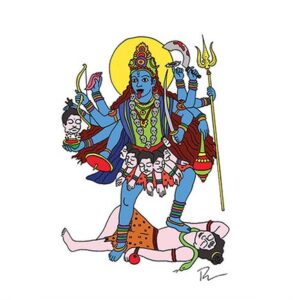
Kali: Goddess of Time and Death
Kali is a Hindu deity symbolizing mastery over time and death. Kali battles the forces of evil on behalf of her children. She is an intimidating figure, brandishing multiple weapons with her four arms. Kali wears a skirt of severed arms and a gruesome garland of heads. These grisly body parts are symbolic of the demonic forces that she slays to protect her devotees.
Kali goes by many names including Mahakali (the Great Mother), Dipta (the One who is illuminated or brilliant), and Uma (lady of the mountains). Kali and Durga are sometimes seen as interchangeable. However, Kali is believed to love battle while Durga slay demons only when absolutely necessary, remaining placid and peaceful at all times. Hear a Kali Mantra and learn more about this fierce goddess.
Krishna: Beloved Avatar of Vishnu
Krishna is one of the most significant deities in Hinduism. He is the eighth incarnation of Vishnu, widely revered among devotees around the world. Krishna is known for the qualities of compassion, tenderness, protection and love. Krishna was born as the son of Vasudeva and Devaki. The story of Krishna’s early life has many parallels with that of Jesus.
Devaki was the sister of Kamsa, the wicked king of Mathura. Kamsa heard a prophecy that he would be destroyed by a child of Devaki and tried to slay her children. Krishna was smuggled across the Yamuna River to escape and was raised by the leader of the cowherds, Nanada, and his wife Yashoda. For this reason, Krishna grew up living an idyllic rural life as a cow herder, known by the names of Govinda and Gopala.
Krishna is often depicted surrounded by cows and playing the flute. As a child, he played many pranks, equaled only by the miracles he also performed. See more information above for Govinda and Gopala. Hear Krishna mantras and learn more about Krishna.
Kuan Yin: Deity Meaning Mercy
Kuan Yin is the Buddhist Savioress, a bodhisattva who has taken a vow to save all beings from suffering. She will forego full Buddhahood until all sentient beings are free. Kuan Yin comes as a Mother to dispel all illusion (maya). A beautiful legend is that Kuan Yin was on the threshold of heaven when she paused and heard the anguished cries of the world.
She returned to earth to help all who are suffering. Her full name, Kuan-shih-yin means “one who regards, looks on and hears the sounds of the world.” She is the protectoress of women, sailors, merchants and children. Learn more about Kuan Yin’s Healing Mantras.
Kujaya: Deity Ruling Mars
The astrology mantra for Mars (Kujaya) includes the seed syllable “kum.” This bija syllable connects to the fundamental vibration of the planet Mars. In Vedic astrology, Mars signifies younger siblings, especially a younger brother. Mars is associated with conflict and war on the one hand and valor and defense on the other.
On the physical level, Mars is related to the muscular system. In ancient Rome, Mars was the god of war and agriculture. The Greek equivalent is Ares, specifically known as the god of the spirit of battle. Ares was less popular than Mars as he was directly associated with brutality and slaughter. Read full article about Astrology Mantras.
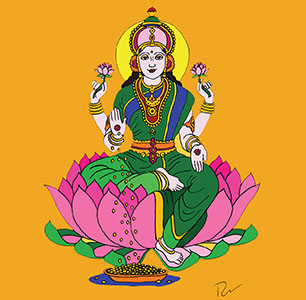
Lakshmi: Deity Meaning Wealth & Abundance
Lakshmi is the Hindu goddess of wealth, fortune and prosperity. The name Lakshmi is derived from a Sanskrit word meaning “goal, aim or sign.” Lakshmi is usually shown seated or standing on a lotus. The lotus symbolizes creation, beauty, harmony, diversity, stability, and support. Lakshmi (or Laxmi) appears in Hinduism, Jainism, and Buddhism.
Lakshmi is also associated with gold coins as well as rice and basil. Lola is another name for Lakshmi meaning one who is moving or flowing. Lakshmi is a presiding deity for the solar plexus chakra, along with her consort Vishnu. Lakshmi is endowed with six auspicious or divine qualities known as gunas. Learn more about Lakshmi and hear a Wealth Mantra.
Lalita: Deity Meaning “The One Who Plays”
Lalita is a Hindu deity whose name means “she who plays.” The goddess Lalita is famously independent, announcing to all, “Whatever I say or do is according to my will alone. Whichever man accepts me as his with must also accept my complete independence.”
The story of Lalita unfolds in the Brahmanda Purana, a thousand year old text in India. The demon Bhanda had an extraordinary power. When he fought his enemies, half of his opponent’s power would be transferred directly to him. The sage Narada warned that only worship of Lalita could save the other gods from Bhanda’s power. Lalita did indeed defeat Bhanda. The moral: it is Shakti, the divine feminine, which gives every victory.
Lalita is portrayed as a young woman holding five arrows, a bow, a noose, and a goad. The arrows are our five senses and the bow is our mind. When we find ourselves pausing on the spiritual path, Lalita gently prods us along with her goad. If we resist her, she lassos us with her noose and drags us back to her lap. Listen to a Lalita Mantra and learn more about this goddess.
Mataji and Babaji: The Immortal Youths
Mataji is venerated as a yogic master representing the Divine Mother. Mataji is the sister of Babaji, an ancient Indian yogi known as the eternal youth. Although Mataji is the spiritual equal of Babaji, she has chosen the role of disciple to her brother. Mataji is the embodiment of compassion.
Mataji and Babaji are an example of the Hindu tradition of saints and deities appearing in both masculine and feminine form, in this case some view them as siblings rather than as romantic partners. In the tradition of paired deities, the male aspect worships the feminine principle of energy and the female aspect worships the male principle of consciousness. Read more in the article Matajai Mantra and Babaji the Immortal Avatar.
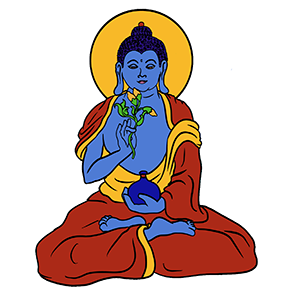
Medicine Buddha: Deity Meaning Healing
Healing has been a significant part of some Buddhist sects. The Medicine Buddha is one of eight healing Buddhas. There are seven other emanations of the Medicine Buddha, each which his own color and pure land. These lands are created as a form of compassionate action on the part of the buddha. They are havens for spiritual dedication. The blue Medicine Buddha is often depicted holding a medicinal plant called myrobalan in his hand. Read about the author’s personal experience with the Medicine Buddha in the article Medicine Buddha Mantra.
Nataraja: Cosmic Dancer
Nataraja is a form of Shiva, a central deity in the Hindu tradition. The name Nataraja means Lord of the Dance. He is a whirling, joyous form of Shiva, often shown with a drum and musical shakers. Nataraja is the ultimate cosmic dancer. Many illustrations and paintings show the cosmos whirling in the background behind depictions of Nataraja.
Nataraja is associated with the crown chakra and with the joy of enlightenment. Nataraja holds fire in one hand and a rhythmic shaker in another. There are snakes coiled around his arm and foot, indicating his mastery over the most deadly of creatures.
Parvati: Deity Meaning Motherhood & Fertility
Parvati, also known as Uma, is the Hindu deity of fertility, love and devotion as well as divine strength and power. She is the gentle and nurturing aspect of the goddess energy. Parvati is part of a trinity of Hindu goddesses that also includes Lakshmi, the goddess of wealth and prosperity, and Saraswati, the goddess of knowledge and learning.
Parvati is the consort of Shiva and the mother of Ganesha and Kartikeya. She is the daughter of Himavan (the god and personification of the Himalayas) and Queen Mena. Parvati’s name is derived from the Sanskrit words for “mountain.” Her name can be translated as “daughter of the mountains.” Listen to a Parvati Mantra and learn more about this beautiful goddess.
Radha: Beloved Consort of Krishna
Radha is the beloved consort of Krishna. In Hindu mythology, Radha was Krishna’s childhood playmate. She is an embodiment of the divine feminine. During Krishna’s childhood as a cow herder, Radha was a milkmaid. Radha is often viewed as a metaphor for the soul and her devotion to Krishna is the longing of the soul for the divine.
The name Radha means “prosperity” and “success”. other interpretations are based on the Snaskrit root “radh,” which means to worship and “rani,” meaning queen. In the Bhakti yoga tradition, she has become popular among Krishna devotees. Radha is an exceptional singer and veena player (an ancient stringed instrument similar to a sitar). Radha possesses the highest form of love and Krishna submissively obeys her commands.
Radha is a form of the deity meaning love, tenderness, compassion and devotion. She is sometimes viewed as a metaphor for the spiritual longing for the divine. Radha is the perfect lover, longing only for Krishna as the focus of her devotion. Listen to a mantra to Radha and read the story of Krishna.
Ram: Incarnation of Vishnu
Ram is one of the most widely known and revered of the Hindu gods. Ram is a form of the deity meaning or symbolizing sacrifice and brotherhood. Ram is an incarnation of Vishnu and the central figure in the Hindu epic Ramayana.
The name or Ram or Rama means pleasing or charming in Sanskrit. Ram is also greatly respected for his loyalty to his wife Sita. He resisted any temptation that could come between him and his beloved. The name “Ram” is also the seed syllable for the solar plexus chakra. This sound activates and balances the solar plexus. Learn more about the sound RAM in Chakra Sounds. Hear the Sita Ram Mantra.
Saraswati: Goddess of Music and the Arts
Saraswati is the Hindu goddess of wisdom, music and the arts. Here is a beautiful legend about Saraswati: A famous Brahmin scholar had a son who was good-hearted but a failure as a scholar. As a result, he was set to tasks of manual labor: cleaning, carrying water and so forth. One day he saw a beautiful young woman in distress by the river. He thought perhaps she had been robbed or abandoned by her family.
The young man rescued her and took her home to give her water and food. As she left the home in deep gratitude, she turned and touched her finger to his tongue. He began to recite complex and subtle poetry in Sanskrit and became a famous orator. The young maiden was Saraswati. Hear a Saraswati Mantra and learn more about the goddess of music.
Shani: Deity Ruling Saturn
In Vedic astrology, Saturn is the bearer of karma. Saturn is slow-moving, taking two and a half years to move from one zodiac constellation to another. Saturn brings responsibility and discipline. Saturn is personified in Hinduism as Shani, an incarnation of Krishna. Approximately every thirty years, Saturn returns to the original place in the natal chart, bringing good or challenging experiences based on the individual’s actions during that period. Read article and hear mantras to all of the Hindu astrological deities in Astrology Mantras.
Shekinah: Divine Feminine in the Kabbalistic Tradition
Shekinah is the glory of the Divine Presence in feminine form. The Hebrews originally worshipped female deities but this was later suppressed by a male-dominated priesthood. Shekinah is the consort of Yahweh and a goddess of healing. Researchers believe she was removed from the Old Testament around 400 or 500 BC.
The presence of female deities was retained marginally as a sacred pole or tree near an altar. Likewise, the cherubim had once been depicted as male and female in an embrace, but this was later sterilized as two interlocking triangles. This is the now-familiar Star of David. Other female deities included Asherah, the wife of El, known as “she who walks on the sea.”
Shiva: Destroyer of Evil
Shiva is one of the principle deities of Hinduism, part of the trinity composed of Brahma, Vishnu and Shiva. Shiva is the destroyer of evil, akin to the Holy Spirit in the Christian trinity. Shiva is alternately depicted both as benevolent and fearsome.
The highest form of Shiva is formless, limitless, transcendent and absolute. Shiva is often depicted slaying demons. He is a householder with Parvati his wife and his children Ganesha and Kartikeya.
Shiva is often shown with a serpent around his neck, a crescent moon as an adornment, the flowing river Ganges flowing from his hair or flowing nearby, the trishula as his weapon and with a damaru (drum) nearby. The dancing form of Shiva is called Nataraja.
Shiva Ra: Deity Meaning “He Who is Like the Sun”
Shiva is a Hindu deity associated with breath or space. He is a powerful Hindu god manifesting throughout the cosmos. Shiva expresses freedom, liberation and joy. Shiva has many forms and names as well as many consorts. He is associated with the third eye chakra between the eyebrows at the bridge of the nose. This sacred spot is sometimes marked on the forehead by the red dot known as the bindu.
The third eye is the door to prophesy. Shiva is alternately depicted both as benevolent and fearsome. In terms of symbolism, he is often shown with a serpent around his neck, a crescent moon as an adornment, the river Ganges flowing from his hair, the trishula as his weapon, and a damaru drum nearby. Hear the Shiva Ra mantra and learn more about the forms of Shiva.
Sita: Eternally Faithful Spouse
Sita is a Hindu goddess known for good character and happiness. She represents courage, dedication and purity. Sita goes through many trials together with her consort Ram, including exile and kidnapping. They are sometimes viewed as symbolizing the unmanifest and the manifest minds or the pineal and pituitary glands.
Sita is the partner and counterpart of Lord Rama (an incarnation of Vishnu). She is esteemed as a paragon of virtue for all Hindu women. Sita is the central female character of the Hindu epic Ramayana. Sita is known for dedication, self-sacrifice, courage and purity.
Sita goes into exile with Rama and her brother-in-law Lakshmana. They settle in the Dandaka forest from which she is abducted and imprisoned by Ravana, the Rakshasa king of Lanka. She is eventually rescued by Rama. Sita then proves her purity in an ordeal of fire and she and Rama return to their own kingdom as king and queen. Sita has two sons, Kusha and Lava.
On the physical level, reciting the names of Rama and Sita is believed to balance both sides of the brain. They represent the yin and the yang or the masculine and the feminine. Sita and Ram are viewed as ideal, devoted spouses. The name Ram is also the seed syllable for the solar plexus chakra. Learn more about the sound RAM in Chakra Sounds. Hear the Sita Ram Mantra.
Sukraya: Deity Ruling Venus
Venus represents marriage as well as other partnerships. Venus also represents the relationship between the individual and finances or material possessions. In the Hindu tradition, Sukraya is the ruler of the planet Venus. Venus is considered to be a refined planet. In order to attain happiness, the individual must change their perceptions in life and balance their karma. Material possessions and partnerships alone will not yield ongoing happiness. Read full article about Astrology Mantras.
Surya: Deity of the Sun
Surya is a Hindu deity who is the source of light or life. Surya is a sun god with a golden chariot driven by Aruna, a personification of the dawn. The chariot is pulled by seven horses representing the seven chakras or energy centers. The sun is usually associated with the masculine; the moon with the feminine. In ancient Egypt, the sun is associated with Horus, Ra and Osiris. Horus represents the rising sun, Osiris the setting sun, and Ra represents the sun’s zenith. Astrologically speaking, the sun is an expression of the outward self, the self that “shines” towards others. Read full article about Astrology Mantras.
Tara: Buddhist Deity Meaning “Star”
Tara is known as the goddess of liberation. In the Tibetan pantheon of deities, Tara is the consort of the Dhyani Buddha Amogasiddhi. Her name means “star”. The Taras are actually a set of Bodhisattvas with varying qualities:
Green Tara: embodies compassion
Red Tara: a fierce goddess who magnetizes all good things
Black Tara: Associated with power
Yellow Tara: associated with wealth and prosperity
Blue Tara: transmutation of anger
Tara exists as a goddess in many other traditions and countries, including Hinduism, Polynesian mythology, Druidism, Finland (Tar, Woman of Wisdom), Roman mythology (Terra, Earth Mother), and South America (the goddess Tarahumara).
Benefits of Deity Meaning: Prayer and Religion
On a practical level, devotion to one or more forms of God seems to be highly beneficial for us as humans. Research shows that prayer and religious faith play an important role in psychological and emotional health. The relaxation response, which lower blood pressure and other indicators of stress, is elicited by prayer as well as creative endeavors.
Research Related to Prayer
Studies at Duke, Dartmouth and Yale show that people who pray tend to get sick less often. For one thing, people who have a set of religious or ethical principles tend to avoid potentially detrimental lifestyle habits. This often includes refraining from smoking and drinking.
Forms of the Deity and Consciousness
For me, the various forms of deity meaning represent different aspects of consciousness. Ultimately it seems that we will reach a state where we experience ourselves as part of everything that is in existence. This means we will be part of every possible mental, emotional and psychological state.
Pantheon of Deities
For this reason, my personal view is that the multiplicity of deities and deity meaning in Hinduism, Buddhism and many other traditions is not in conflict with monotheism. In fact, the pantheon of Hindu gods is reminiscent of the many Catholic saints of my childhood.
Deity Meaning on the Personal level
When I was being confirmed in the Catholic church as a young teenager, I took the choice of a confirmation name very seriously. I borrowed books from the parish library and read the lives of the saints to find one I wanted to emulate. Each saint had unique characteristics similar to deity meaning in other religions.
Saints as Deities
Each had a particular aspect of God that was their specialty. Many of their lives were quite dramatic, sometimes even bizarre. The feats they performed and the miracles associated with them made them feel superhuman.
Stories of the Saints
These stories of saints were similar to the mythologies associated with deities in other religions. In addition, sometimes the Hindu deities are an intense mix of godlike qualities and seemingly very human attributes. This includes jealousy, envy, revenge and so forth. Perhaps this is closer to classical mythology (the heroes and heroines of the Greeks and Romans) than Catholic saints.
Deity Meaning & Spiritual Development
In the end, I feel the most empowering approach is to ask myself what qualities I need to develop to be a more complete human being:
- Do I need to be ruthless in separating myself from a victim mentality?
- Do I need to care less what others think?
- Do I need to pursue my own path with more power and directness?
- Do I need to clarify my goals?
- Do I need to be a better example of adventurous living for my children?
- Do I need to soften and treat others with greater patience?
- Which form of the deity best exemplifies the qualities that I want to embody?
- What is the deity meaning associated with any form of God?
My spiritual practices including mantras are really a way to develop those qualities within myself rather than worship an external being. I like to know the meaning of the mantras. I like to be conscious of my intent. I hope that if I focus on developing specific qualities exemplified in various deities (clarity, compassion, power), I will be a stronger, more loving human being.
Author Kathleen Karlsen
Kathleen Karlsen is a musician, artist, writer and speaker. She is the author of two books (Flower Symbols and Vocal Medicine) and over 200 articles. Kathleen, her husband Andrew, and their five children live in Bozeman, Montana. More about Kathleen Karlsen.

